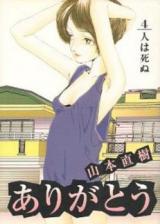A very very spot-on social commentary which reflects the issues and decay of a society which still tries to cling onto "old values and mentalities(interpreted from a 21st century point of view)" that are long outdated in this day and age. And it's also about the generations who had to cope with a post-war Japan where a country on the brink of destruction had to survive and respond towards recession and the "boom age" and other events that completely affected their lives, as well as those who were born far later. It's a pity the plot is very disjointed because it's basically a random sequence of events strung together, so they can serve as the basis of the commentary.
It's the same for the characterization because the casts are simply based upon different types of people and also mentalities within the middle-class aspect of Japanese society and they have all sorts of details stuffed into them, regardless of consistency. So, it's all quite a jumbled mess.
I'm no Japanese and can't really speak for another culture I know little about but being an Asian, some of my generation and many of the older generations sure do deal with things just as depicted.
And unfortunately, much of these details are probably lost to those who don't understand Japanese society or even certain Asian societies at all. Hence, the confusion of a number of readers.
Everything is quite interesting and likely, depicted quite accurately:
the mentality and attitude of the father as in how he tries to be a "man", how he refuses to trust the police and attempts to use connections to "fix" things, how he tries to be strong, bright and cheery even when things go wrong(but often in the wrong ways) which follows the concept of harmony(wa) and so on. He is based on the type of middle-class salarymen who were brought up to the ideology that they'd to dedicate themselves selflessly to contribute to society, without regards to the effects these had to their family. Btw, it truly is ironic that though he tried so hard to keep his family together, it was only his impending death which did so.
The school's authorities keep blabbering about policies and everything which is very typical of the Asian method of sweeping the issues under the carpet in order to maintain harmony as in to present a "perfect picture" which is stained by nothing
As for the older sister, she represents the kind of "young woman" who has been brought up to a certain ideal(in this case, submissive) and to accept things just as they are. Therefore she simply lets the rapists have their way with her. She also likely reflects the typical Japanese who will bury their feelings and thoughts within in order to prevent conflict and maintain harmony(wa). Incidentally, her personality reflects the result of a very stupid form of thinking that likely emerged in the 21st century in order to hold together a society that was rapidly falling apart due to modernization, rapid loss of old values and so on.
The youngest sister probably represents the kind of young generation who has to struggle with the mentalities and the values of the "old and modern". She tries to take action by calling the police but at the same time, on another occassion, when she sees the gang with another girl, she decides to keep quiet because it would cause a mess(conflict with harmony). She does struggle to resist against life but well... her actions of course, reflect the sensibility of her age. At the same time, she uses her father as a punching bag for the things that have gone wrong. She also reflects the cynicality, cold and harsh attitude her generation holds towards others and also, themselves. That is: she has little self-worthiness and so she holds little compassion and understanding towards others and instead, thinks that doing so is being "tough and ballsy". Just like her generation, she is often not afraid to show her true opinions and feelings(honne) in the presence of others and quite often, ignores the concept of showing a behaviour as expected of her position and rank within society(tatemae).
The mother herself probably reflects the kind of woman who is expected to hold together a household, in the face of a society's norms and expectations and her family's problems, and who drinks a lot in order to deal with all these issues. She probably represents a realistic outcome of Japan's drinking culture where a lot of people seem to drink copious amounts(as part of their "harmony" stuff), ignoring how much damage over-drinking will cause your health(sweeping the "dirty things" under the carpet).
The gangs likely represent the kind of youth who are completely lost in this age and for whom "sex, drugs, violence, etc." are the factors which hold them together. Probably because they grew up in an age where convenience, societal pressures, etc. are burdened upon them and the parents completely ignore them. Since they are regarded as the "dirty things" which are ignored and abandoned because they don't fit with the idea of a "sparkling and beautiful society where everything runs smoothly", they are lost and completely well... troubled because they just run loose without anyone to really care for them. And because they don't value themselves and others, so they go on rampages and stuff, without little to no idea or care about the consequences of their acts. They engage in fights, steal, take drugs, commit sexual assault, murder, etc., and so on.





